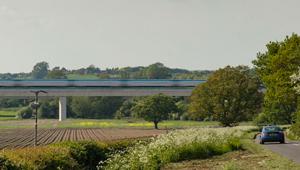The decision to end the Renewables Obligation programme for new onshore wind generating stations across Great Britain will fulfil a Conservative manifesto commitment to end the subsidy sooner than proposed by the coalition government. The programme will then close to all other generation sources in April 2017, as it is being phased out as part of the moves to a new “Contracts for Difference” regime.
Announcing the move today, Rudd said the government had a long-term cleaner energy plan, which would help keep bills as low as possible. In 2014, wind power developments received around £800m of support through the programme, and generated 5% of the UK’s total electricity.
As high volumes of onshore wind projects were either now operating or planned, the UK was well on the way to meeting its climate change targets, she stated. It was therefore time for technologies such as wind power to “stand on their own two feet” and the government would give local councils extra powers to veto developments.
“As part of our plan, we are committed to cutting our carbon emissions by fostering enterprise, competition, opportunity and growth.
“So we are driving forward our commitment to end new onshore wind subsidies and give local communities the final say over any new wind farms. Onshore wind is an important part of our energy mix and we now have enough subsidised projects in the pipeline to meet our renewable energy commitments.”
However, up to 5.2GW of onshore wind capacity could be eligible for support for a “grace period”, which Rudd said she was minded to offer to projects that already had planning consent, a confirmed grid connection and land rights.
Under the plans to boost the power of local communities over the approval of wind farms, the Department for Communities and Local Government announced sites would only get the go-ahead if they have been clearly backed by local people in a Local or Neighbourhood Plan. Scheme promoters will also need to have shown they have acted on the concerns identified by local communities following consultation, in addition to approval in the plan.
If a planning application has already been made for wind turbines in an area where the local plan does not identify suitable sites, DCLG said the council will only be able to approve this where the planning concerns of the affected community have been addressed and the scheme therefore has local backing.
Local Government Secretary Greg Clark said the government’s “One Nation approach” would back people on the issues that really matter to them, and the plan to given local people a greater say delivered a Conservative manifesto commitment.
Responding to the announcement, Scotland’s energy minister Fergus Ewing said the Scottish Government could seek a judicial review of the “deeply regrettable” move. It would have a disproportionate impact in Scotland, he highlighted, which is home to around 70% of planned onshore wind projects.
The decision to scrap the provision for onshore projects while continuing to offer it as planned for offshore wind was “irrational”, Ewing said.
The UK government have chosen to place at risk a huge investment pipeline, conceived in good faith by developers based on statements from the UK government.
“The Scottish Government remains ambitious for the renewable energy industry and aims to maximise the vital contribution it makes towards tackling climate change. We will continue to work together with the industry as we continue to support the growth of renewables in Scotland.”




















